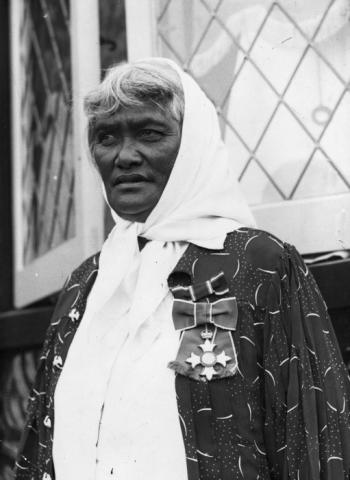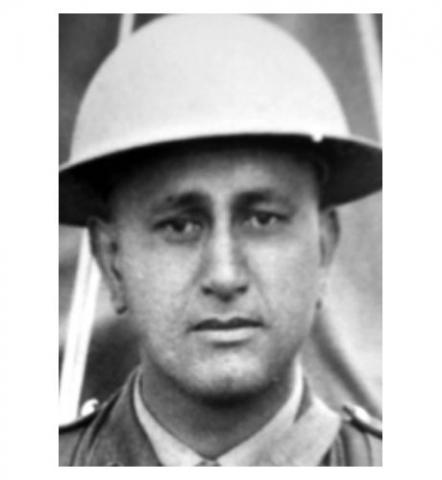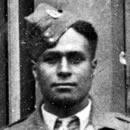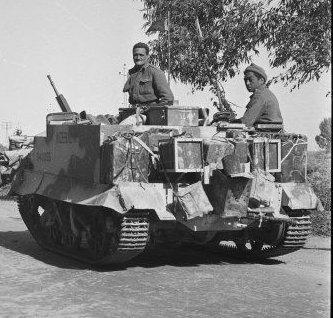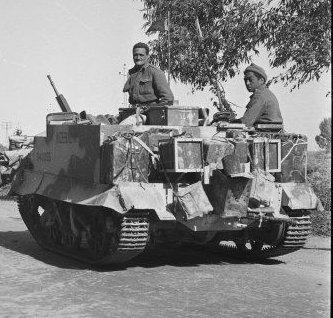<p><strong>Lt Webb sends greeting to members of the Maori Battalion from the South Island. </strong></p><h2><strong>Transcript</strong></h2><p><strong>MC: </strong>Lt Webb, representing of, sending greetings to members from the South Island.</p><p><strong>Lt Webb: </strong>Greetings South Island, Pitamas, Matthew, West send you greetings form the South Isand and hoping in the near future we’ll be able to join you and once more renew old acquaintances. Tena koutou, tena koutou</p><p><strong><br /></strong></p>
Media library
Audio
<p><strong>Sound file</strong> from Ngā Taonga Sound & Vision, ref: <a href="https://www.ngataonga.org.nz/collections/catalogue/catalogue-item?recor…;. Any re-use of this audio is a breach of copyright.</p>
<p><strong><em>Putiputi kanehana </em>by the reknowned Ngati Porou songwriter Tuini Ngawai is performed here by Reinforcements of the Maori Battalion. This recording was part of a broadcast where messages and items were performed for members of the Maori Battalion serving overseas.</strong></p><h2><strong>Transcript<br /></strong></h2><p><strong>MC: </strong>The Reinforcements will now sing <em>He Putiputi</em></p><p><strong>Reinforcements sing:</strong><br />Putiputi kanehana e<br />Maku koe e kato e<br />Mehemea ko koe<br />Taku tau pumau<br />Piri rawa i tenei uma e</p>
<p><strong>Sound file</strong> from Ngā Taonga Sound & Vision, ref: <a href="https://www.ngataonga.org.nz/collections/catalogue/catalogue-item?recor…;. Any re-use of this audio is a breach of copyright.</p>
<p><strong><em></em>Te Puea sends greetings to the Maori Battalion during a radio broadcast.</strong></p><h2><strong>Transcript</strong></h2><p><strong>MC: </strong>Princess Te Puea will now send greetings to the members of the Maori Battalion.</p><p><strong>Te Puea: </strong> Nga uri o nga tangata o runga i nga waka - i a Te Arawa, i a Mataatua, i a Horouta, i a Takitimu, i a Kurahaupo, i a Aotea, Tokomaru, Tainui, Ngatokimatawhaorua – tena koutou. Tena koutou e noho mai nei te aroaro o to tatou kingi. Te aroaro o te pakanga. Kei te mihi atu kia koutou i to koutou maia. Te whanau - tena koutou e mihi mai nei ki ahau, e mihi mai nei kia Koroki, e mihi mai nei kia Waikato. Noho mai te aroaro o to tatou kingi. Ma te atua koutou, tupuna koutou e manaaki, e whakahoki mai ki Niu Tireni nei. Tena koutou katoa.</p><p><strong><br /></strong></p>
<p><strong>Sound file</strong> from Ngā Taonga Sound & Vision, ref: <a href="https://www.ngataonga.org.nz/collections/catalogue/catalogue-item?recor…;. Any re-use of this audio is a breach of copyright.</p><p><strong>Image: </strong>Princess Te Kirihaehae Te Puea Herangi. Original photographic prints and postcards from file print collection, Box 2. Ref: PAColl-5584-58. Alexander Turnbull Library, Wellington, New Zealand. <a href="http://natlib.govt.nz/records/23249698">http://natlib.govt.nz/records/2…;
<p><strong>The Reverend Mutu Kapa <acronym title="Member of the British Empire">(MBE)</acronym> sends greetings to the Maori Battalion overseas. </strong></p><p><strong>Kapa was an esteemed leader within his Te Aupouri and Waikato tribes and was well versed in the his tribal traditions. Kapa was encouraged by his great-grandfather to train as an Anglican priest – he was ordained a deacon in 1907 and priest in 1911. <a name="ftnref1"></a>[<a href="#ftn1">1</a>]</strong></p><p><strong><br /></strong></p><h4><strong>Footnote</strong></h4><p>[<a href="#ftnref1">1</a>] Manuka Henare. 'Kapa, Mutu Paratene', from the Dictionary of New Zealand Biography. Te Ara - the Encyclopedia of New Zealand, updated 30-Oct-2012<br />URL: <a href="https://teara.govt.nz/en/biographies/4k2/kapa-mutu-paratene" target="_blank">https://teara.govt.nz/en/biographies/4k2/kapa-mutu-paratene</a></p>
<p><strong>Sound file</strong> from Ngā Taonga Sound & Vision, ref: <a href="https://www.ngataonga.org.nz/collections/catalogue/catalogue-item?recor…;. Any re-use of this audio is a breach of copyright.</p>
<p><strong>Reinforcements of the Maori Battalion sing <em>E rua nei aku ringa </em>during a broadcast for their comrades oversesas.</strong></p>
<p><strong>Sound file</strong> from Ngā Taonga Sound & Vision, ref: <a href="https://www.ngataonga.org.nz/collections/catalogue/catalogue-item?recor…;. Any re-use of this audio is a breach of copyright.</p>
<p><strong>Reinforcements of the Maori Battalion in New Zealand sing <em>There will always be an England </em>during a broadcast.</strong></p>
<p><strong>Sound file</strong> from Ngā Taonga Sound & Vision, ref: <a href="https://www.ngataonga.org.nz/collections/catalogue/catalogue-item?recor…;. Any re-use of this audio is a breach of copyright.</p>
<p><strong>Major Wales sends greetings to Colonel Dittmer and the Maori Battalion, he was in charge of training.</strong></p><h2><strong>Transcript</strong></h2><p><strong>MC: </strong>Major Wales will now send greetings to Lieutenant Colonel Dittmer, the officers and men of the Maori Battalion. Major Wales is in charge of the training of the Battalion and also the Reinforcements in Papakura. </p><p><strong><strong>Major Wales: </strong></strong>Colonel Dittmer, officers, NCOs and men of the 28th Maori Battalion. Tena koutou, tena koutou. We here in New Zealand training the reinforcements send you greetings and we tell you that the boys who are coming forward to reinforce your Battalion are some of the finest of the young men of New Zealand today. They are men of whom you will proud and we say it with pride that they are men who are worthy to represent the Maori race with its wonderful fighting tradition. Tena koutou, tena koutou, kia ora.<strong> <br /></strong></p>
<p><strong>Sound file</strong> from Ngā Taonga Sound & Vision, ref: <a href="https://www.ngataonga.org.nz/collections/catalogue/catalogue-item?recor…;. Any re-use of this audio is a breach of copyright.</p>
<p><strong>This waiata tangi (lament) is sung by members of Te Whakatohea for their relatives who had died in the war. It was recorded at the opening of the Tama te Kapua meeting house at Rotorua in 1943.<br /></strong></p><h2><strong>Transcript<br /></strong></h2><p><strong>Sir Apirana Ngata: </strong>Amongst the tribes assembled at the opening of the Tama te Kapua meeting in March of 1943, was the Whakatohea tribe of Opotiki. They also had in their time a great reputation as masters of many aspects of Maori culture, including the chanting of the old songs. This is an adaptation of an old song commencing <em>E muri ahiahi</em> adapted by them and sung as a lament for the men from their district of the Maori Battalion who had died in service overseas. They were led by Te Hapua Apanui of Opape near Opotiki.</p><p><strong>Te Hapua Apanui:</strong> He waiata tangi na Te Whakatohea mo nga tamariki kei te pae o te pakanga</p><p> </p><p> </p>
<p><strong>Sound file</strong> from Ngā Taonga Sound & Vision, ref: <a href="https://www.ngataonga.org.nz/collections/catalogue/catalogue-item?recor…;. Any re-use of this audio is a breach of copyright.</p>
<p><strong>This <acronym title="ditty, short song">ruri</acronym> </strong><strong><em> [<a href="#ftn1">1</a>]<a name="ftnref1"></a></em> was written by Wiremu Raerena for Captain Arnold Reedy (C Company, Main Body). In introducing the ruri Sir Apirana Ngata explains that it was composed during a time when Reedy was reported missing on Crete. </strong></p><p>The Allies evacuated from Crete in May 1941 but they could not take everyone. Reedy volunteered to remain on the island after realising a number of his relatives would be left behind. </p><p>Kawa Kaa and Te Kooti Reihana from Reedy’s platoon wrote to his mother Materoa Reedy about this:<br /><em>“Ko te Whio Parae, Ted Wanoa (na te Matauru Wanoa) me Arthur Brooking (na Taken) nga hoa o Nehe i mau ai. Kei te mohio rawa atu maua ko taku tuakana ko Kawa, ko matau hoki te ope whakamutunga o nga Maori ki te piki mai ki runga tima. Ka eke tonu mai a ia mehemea a ia i haere mai. Ka pewhea hoki a te Whio ma. Kei whea he pakeke mo ratau? Na reira a Nehe i noho ai.” [<a href="#ftn2">2</a>]<a name="ftnref2"></a><br /></em></p><p><em>Translation: “Whio Parae [Wish Manuel], Ted Wanoa (Matauru Wanoa’s son) and Arthur Brooking (Duncan’s son) were captured with Nehe. My cousin Kawa and I are certain of this as we were the last Maori to board the ship. He could have been with us if he wished to. But what about Whio and the others? Who would be an elder for them? That is why Nehe stayed behind.” <br /></em></p><p>After waiting overnight for the ships to collect them, the men were told that no ships would be coming. Reedy along with 71 other Maori were taken as prisoners of war. He spent four years in captivity in Germany and returned home aboard the <em>Mauretania </em>reaching New Zealand on August 5, 1945.</p><p>NB: Site editors note - there is static throughout the recording.</p><p><strong>Reference</strong><br />[<a href="#ftnref1">1</a>]<a name="ftn1"></a> Sir Apirana Ngata, Nga Moteatea: Part 1, 1928, p. xxv<strong></strong></p><p>[<a href="#ftnref2">2</a>]<strong><a name="ftn2"></a> </strong>Monty Soutar, Nga Tama Toa, 2009, p.153</p>
<p><strong>Sound file</strong> from Ngā Taonga Sound & Vision, ref: <a href="https://www.ngataonga.org.nz/collections/catalogue/catalogue-item?recor…;. Any re-use of this audio is a breach of copyright.</p><p><strong>Image</strong> Nga Taonga a Nga Tama Toa Trust</p>
<p><strong>Charles Bennett speaks at the unveiling of the Ngarimu memorial at Te Poho o Rawiri marae, Gisborne.</strong></p><p><strong>Transcript</strong></p><p><strong>Charles Bennett:</strong> This afternoon, I think it’s most appropriate that we should be unveiling this memorial to Moana nui a kiwa Ngarimu and those of his friends who did not return. Because it was on this very day, the 27th of March 1943 that Ngarimu was killed at Pt 209. I was there, and I remember when the attack was done by C Company the previous evening on this Pt 209 feature, which was heavily defended by the Germans. It was a rocky feature and the Germans were all dug in, into the rock - almost an impregnable position. And I knew we had a very tough job. But the army generals had told us that this feature had to be denied to the enemy because he could look over and see all our movements, we were forming up to break through this Tebaga Gap. Unfortunately for C Company the job of taking this hill feature in broad daylight, I think the attack started at 3 o’clock in the afternoon, frontal attack, uphill, rocky feature, unfortunately C Company and Ngati Porou it was their turn. Now, in the morning, news had trickled down to me, uh, news of the outstanding contribution of Ngarimu. You know before that, both General Freyberg and Brigadier Kippenberger - our superior officers, they said to me you know it’s a pity we haven’t been able to give a Māori soldier the Victoria Cross. See unfortunately right from the very beginning even through Greece and Crete the Māori Battalion fought as a whole unit and performed outstandingly. And if it were possible I would say to, to award a Victoria Cross to a whole unit the Maori Battalion would have got it well before in Crete and Greece. But unfortunately there was not, all the soldiers were good, all the fighting was outstanding but we couldn’t select one. And of course when we heard about Ngarimu’s exploits, word was passed down to me, we knew that here was our chance. And of course our superior officers, the generals were all delighted when they heard about this. In point of fact, we were discussing the award; I was discussing with my officers the award of the Victoria Cross to Ngarimu, this particular morning. Ah it was, it was ah Bully Jackson, I remember well, and Wally Haig who came down from Pt 209 in the morning and said to me “this man is deserving of the Victoria Cross.” And so I started questioning them to get more details and it was just while we were discussing this that the Germans broke through again, on the top, broke through and it was at that moment that Ngarimu was killed. However, it is appropriate that I think at this occasion, we should think about those outstanding soldiers, we should think about Ngarimu and all those others who laid down their lives to protect their country and their people.</p><p><strong>Elder reads inscription:</strong> The inscription on the tablet, written in Maori: <br />“He tohu aroha ki nga tama toa i haere atu i konei ki te pakanga nui o te kotahi mano iwa rau toru tekau ma iwa (1939) ki te kotahi mano iwa rau wha tekau ma rima (1945) tae atu hoki ki nga kaihautu o Te Poho o Rawiri na ratou nei e manaaki”. <br />That’s the Maori way, there are 100 licensed interpreter ‘round about you and they’ll tell you all about it. Thank you very much. </p><p> </p>
<p><strong>Sound file</strong> from Ngā Taonga Sound & Vision, ref: <a href="https://www.ngataonga.org.nz/collections/catalogue/catalogue-item?recor…;. Any re-use of this audio is a breach of copyright.</p><p><strong>Image<br /></strong>Detail of <a href="/node/3910" target="_blank">Officers at Katerini</a><br /><a href="http://timeframes.natlib.govt.nz/">Alexander Turnbull Library</a><br />Reference: DA-14231<br /> Permission of the Alexander Turnbull Library, National Library of New Zealand, Te Puna Mātauranga o Aotearoa, must be obtained before any re-use of this image.<strong><br /></strong></p>
<p><strong>Te Tohara (Charlie) Mohi grew up in Pakipaki. He embarked for war in 1941 and served with the Maori Bren-carrier platoon. <br /></strong></p><p><strong>In this recording Charlie talks about why he signed up for war and his concerns about leaving his mother and siblings at home.</strong></p><p><strong>Charlie returned on furlough in 1945, see the photo <a href="/node/22923">here</a>.<br /></strong></p><h2><strong>Transcript<br /></strong></h2><p><strong>Pou Temara (interviewer):</strong> He aha to nama, me to, tuatahi ko to ingoa, ko to nama, me to rank, ia koe i te, i te whawhai?</p><p><strong>Te Tohara Mohi: </strong>Taku ingoa ko Te Tohara Mohi. Te nama, taku nama ko te ono tekau ma rima mano, e rima rau, tekau ma tahi, tekau ma waru. A, taku turanga i roto i nga hoia, he heihana. Engari he heihana a ka hoki ano ki te hoia, ka heihana, ka hoki ano ki te hoia, i roto i nga mahi porangi a te hoia. </p><p><strong>Pou Temara: </strong>Tena, e hia o tau ia koe ka whakawhiti koe ki te pakanga?</p><p>E rua tekau ma tahi oku tau, taku haere. Engari I taku hainatanga, ki te, ki roto i te, i nga mahi a te pakanga, tekau ma waru aku tau. I roto au i nga mahi a nga, e kii nei, ko nga Territorials. Ko matou i Heretaunga, ko matou te roopu tuatahi o the Vickers Machine Gun o Niu Tireni nei. Kare hoki te Maori e mahi ana i tera mahi i aua wa. Engari na matou te tuatahi o taua mahi. Engari te putamaitanga o te whawhai tuturu a i mea mai i a Trentham nei matou, i roto i te camp i reira. E noho ana matou i reira, a, ka timata te whawhai. A ka mauri atu te iwi, te First Echelon, e korerotia nei ko te First Echelon. Ka haere ratou ka hoki matou i te kainga. I puta mai matou i te Territorials, haina tonu atu matou, nga tamariki, nga mea pakeke katoa o to matou kainga o te Pakipaki i haina katoa i roto te, kia haere matou ki tera taha. </p><p>Engari te taenga mai ki te wa o matou ingoa whiriwhiritia, ka pana maingia au ki waho, he tamariki rawa, a, ahua nui tonu matou. Engari nga mea o matou i uru atu, ko Bully ma – te papa o tenei, ahua nui tonu nga mea o te kainga i haere, a me taku tuakana. </p><p><strong>Pou Temara: </strong>Tena, he aha te tau i haina ai koutou ki te haere ki te pakanga.</p><p><strong>Te Tohara Mohi: </strong>I te timatanga tonu o te pakanga i te toru tekau ma iwa.</p><p><strong>Pou Temara: </strong>He aha te tau i whakawhiti ai koe?</p><p><strong>Te Tohara Mohi: </strong>A, i te wha tekau ma tahi.</p><p><strong>Pou Temara: </strong>Tena, he aha ou koutou whakaaro, ou whakaaro, ia koe ka haere koe ki te haina. He aha ou whakaaro – kei te haere hoki, kua tu te pakanga, kua haere koe ki te haina, kia haere koe ki te pakanga. I uru mai ano he whakaaro patu tangata ki roto ia koe, e haere ana hoki te patu tangata kare ranei koe e hoki mai, e hoki ora mai ki te kainga ekene koe ka mate atu?</p><p><strong>Te Tohara Mohi: </strong>E kare rawa tena whakaaro i puta mai. Ko te mea i puta mai i roto oku whakaaro – e rua aku papa i haere. I uru aku papa i haere ki te whawhai tuatahi. I ta ratou haeretanga, ko te hokimaitanga ko nga korero mo nga wahine, mo nga takaro, mo nga mahi, mo nga mahi pai. Kare e korero mo nga mahi kino o te whawhai. No reira, i taku haina, i taku hainatanga kare ke nga whakaaro haere atu mo te mate ranei, te aha ranei. Hey, hei haere te kite whenua, haere te kite i nga mea i korerotia mai nei e to matou papa kia matou. Koira noa iho. </p><p>Engari no te taenga ki reira, well, no te wehenga atu, kua ahua roa matou i Niu Tireni nei e whakapakari ana i o matou tinana, ka haere, kua tae ki te wa e haere ki tera taha, a, ka puta mai nga whakaaro i taua wa. Ko wai hoki e manaaki te koka? Ko wai e tiaki i a ia? Ko to matou koka he pouwaru. A, i korero maua ko taku tuakana, ko ia i haere te mea tuatahi, i te roopu tuatahi. Ka korero mai ia kia au, “noho ai te kainga, te manaaki i to taua koka.” Well, i te taenga kia au kia haere, korero atu au ki taku, ki to maua teina – tekau ma ono noa iho nga tau o te poi nei, i te kura tonu i Te Aute. Ka haere maua, korero atu maua ki a ia – “manaakitia to taua koka, to tatou koka”. A, koira nga korero. <br /> <br />Engari te haeretanga, e hoa, haere atu to matou waka, to matou tima i konei, i Poneke nei, puta atu i te whenua, puta atu ki te moananui, ka huri mai nga whakaaro ki te kainga. Ka titiro mai, ahua pouri haere ana matou, titiro atu ai - kei te hoki mai ano tenei Maori, kare ranei? Kua puta mai te aroha ki te kainga i taua wa. Engari mo tera, aye, kei te haere ke matou mo te mahi pai, te ataahua o te whenua e titirotia nei e matou. Na runga i era korero katahi ano ka whakaaro, aye, he mahi tika tonu te mahi nei. Ka wehe atu akuni pea kare e hoki mai. Ka hoki waku whakaaro ki taku koka i taua wa. Ma wai hoki e manaaki, kei te tamariki hoki toku teina, kei te kura tonu. And, oh well, ko nga whakaaro ano me nga inoi ki te Runga Rawa kia whakahokia mai i te kainga i nga wa e hoki mai ai. Ko tera noa iho nga whakaaro i roto i au i taua wa. </p>
<p><strong>Sound file</strong> from Ngā Taonga Sound & Vision, ref: <a href="https://www.ngataonga.org.nz/collections/catalogue/catalogue-item?recor…;. Any re-use of this audio is a breach of copyright.</p><p><strong>Image<br /></strong>Crop of <a href="/node/3856" target="_blank">full photo</a> - Bren-carrier platoon leads the Maori Battalion into Tripoli, 23 January 1943. Sgt Te Whiu Purei (standing) and Charlie Mohi, seated.</p>
<p><strong>Te Tohara (Charlie) Mohi grew up in Pakipaki. He embarked for war in 1941 and served with the Maori Bren-carrier platoon. </strong><strong>Charlie returned on furlough in 1945, see the photo <a href="/node/22923">here</a>.</strong></p><p><strong>After leaving New Zealand the Reinforcements docked at Freemantle for a short while.<br /></strong></p><h2><strong>Transcript<br /></strong></h2><p><strong>Te Tohara Mohi: </strong>Engari te taenga atu ahua tata atu matou ki Ahitereiria ra, ko au tetahi ano te, o te, o nga Kaari o te o te tima, ta matou mahi e whakatutu haere i a matou to matou Apiha, e kore e maungia atu he pia ki waho, e tama, i aua wa ra kua pia katoa nga wa, nga tima. </p><p>To matou taenga atu ki a Freemantle, ki Perth. Tae atu matou ki Freemantle, a, kare matou e tukua kia haere ki runga i te whenua haere, oh, ki roto i te taone. Te mataku o nga, o matou apiha, kei puta atu matou kare hoki e whakaengia nga Ahitereiria kia haere atu ki te whenua ra. No te mea ko tera te tuatahi o nga raupatutanga i a ratou, o nga hoia o tera taha. A, ka tuku atu a ratou kia hoki atu ki to ratou whenua, hei, ngaro to reo. A, koa oti ta matou mahi i reira ka tae mai nga tima o, o tahaki, mau mai ngia a nga kai mo to matou waka, mo to matou tima, a, nga mea toa o matou kua heke atu ki runga i nga, ki nga tima paku, a hoki atu ki te, ki te taone, ki reira karia ka haere. Mahi porangi, haurangi noa, a, ka karangahia matou kia haere ki te tiki, ah well, to matou taenga atu ki reira, ka ngaro ano hoki matou.</p><p>Koinei nga mahi tinihanga, nga mahi a te hoia, to matou hoki mai tanga ki, ki runga i to matou waka, ah well, ka karanga mai ngia e Bully Jackson, “Haramai Mohi.” I said, “He aha tena Bully?” “Kia tangongia atu te mea nei.” A, ko Bully hoki to matou apiha, a ko Bully ae, he Apiha pai.</p><p><strong>Pou Temara: </strong>Ana, ka tangohia atu nga stripes.</p><p>A, ka tangongia atu. E rua, toru, iwa kare tahi hoki he Heihana naku i timata ka homaingia ano.</p>
<p><strong>Sound file</strong> from Ngā Taonga Sound & Vision, ref: <a href="https://www.ngataonga.org.nz/collections/catalogue/catalogue-item?recor…;. Any re-use of this audio is a breach of copyright.</p><p><strong>Image<br /></strong>Crop of <a href="/node/3856" target="_blank">full photo</a> - Bren-carrier platoon leads the Maori Battalion into Tripoli, 23 January 1943. Sgt Te Whiu Purei (standing) and Charlie Mohi, seated.</p>



